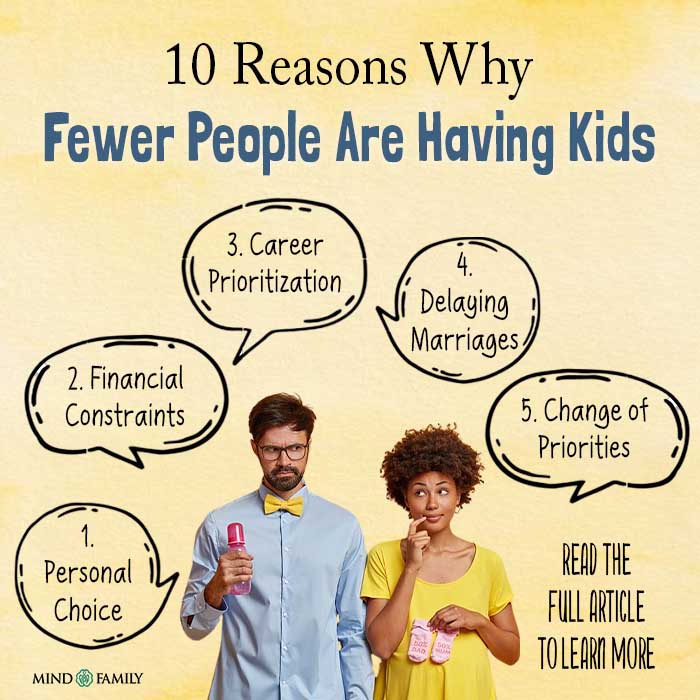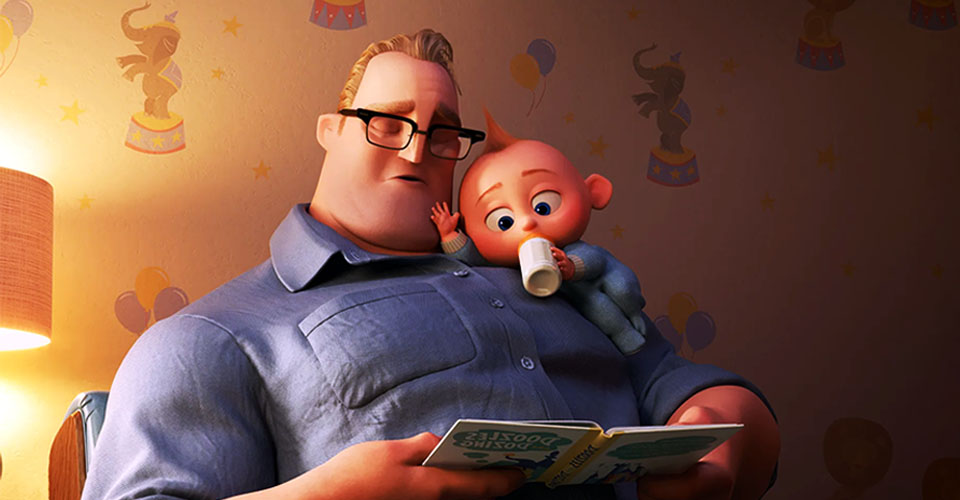The decision to start a family or remain child-free is deeply personal, shaped by a variety of factors ranging from financial constraints to personal health and societal shifts.
This trend is influenced by a multitude of factors that vary across different regions and socioeconomic backgrounds.
Below are ten key reasons why fewer people are having kids. We will also give you reasons why starting a family is important for you.
10 Reasons Why Fewer People Are Having Kids

1. Personal Choice
More people are deciding that they simply do not want children. In 2023, Pew Research found that 44% of childless adults under 50 in the U.S. stated that they are unlikely to ever have children, up from 37% in 2018.
Notably, 56% of childless individuals under 50 said they just don’t want kids, with no other reasons involved for fewer people are having kids. The growing acceptance of child-free lifestyles and a focus on personal fulfillment are driving this trend.
2. Financial Constraints
Raising a child in the U.S. is expensive, and many adults feel they cannot afford to provide for children. The average cost to raise a child until the age of 18 is now estimated at over $300,000, which doesn’t include college tuition.
Financial insecurity, stagnant wages, and rising costs for housing, healthcare, and childcare lead 36% of the reasons why fewer people are having kids.
These financial pressures are amplified by the economic instability many families experienced during and after the COVID-19 pandemic.
3. Career Prioritization
Many younger adults are focusing on building their careers before considering starting a family. With an increasing emphasis on professional achievement, more individuals are postponing or forgoing parenthood altogether.
A recent study found that 31% of women aged 25-34 prioritize their career progression over having children. Balancing work and family life can be difficult, particularly with limited parental leave policies and workplace support for families.
As people invest more time in their careers, they may decide not to have children at all, finding fulfilment in their professional success.
4. Delayed Marriages
The average age of marriage in the U.S. has been steadily increasing, which has a direct effect on when or whether couples choose to have children. In 2023, the median age for first marriages was 30 for men and 28 for women, up from 23 and 21, respectively, in 1980.
The delayed age of marriage pushes back the timeline for childbearing. As more people wait until their 30s to marry, they may have fewer children or decide not to have any due to reduced fertility or lifestyle preferences.
5. Environmental Concerns

Environmental worries, including climate change, are becoming a more prominent factor in people’s decisions not to have children.
A 2023 survey found that 5% of childless adults cited concerns about the environment, including overpopulation and climate change, as a reason for not having kids.
For many, the uncertainty surrounding the future of the planet and the ethical implications of bringing a child into an increasingly fragile world are major considerations.
6. Healthcare and Fertility Issues
Medical conditions and fertility challenges also contribute to the decline in birth rates. About 19% of childless adults reported medical reasons for their decision not to have children.
Additionally, age-related fertility declines are a major concern for those who delay childbearing into their late 30s or 40s. Advances in reproductive technology help some, but for others, the medical and emotional costs of fertility treatments may be prohibitive.
7. Concerns About the Future
The global political and economic landscape creates uncertainty for many potential parents. About 9% of respondents in a 2023 survey cited the “state of the world” as a reason for not having children.
Concerns about political instability, economic volatility, and social unrest have led to fewer people are having kids asking whether it’s responsible to bring a child into an uncertain future.
8. Lack of Support Systems
The U.S. ranks poorly in terms of parental leave and support for new parents compared to other developed nations. Without sufficient policies in place, such as universal daycare or extended parental leave, many prospective parents feel unsupported.
The high cost of daycare and the absence of a robust social safety net lead many to decide against having children, with 17% of people citing a lack of childcare options and support as a major reason for staying child-free.
9. Partner Status
Some individuals remain childless due to the absence of a suitable partner. About 15% of childless adults in 2023 said they hadn’t found the right person to start a family with, which can delay or prevent family planning altogether.
As societal norms evolve and traditional timelines for marriage and children become less rigid, many people opt to wait longer, making it seem like fewer people are having kids.
10. Personal Health and Well-being
Mental health challenges are another reason more people are choosing not to have children. The American Psychological
Association notes that many young adults cite anxiety, depression, and the pressure of balancing life demands as factors in their decision to remain child-free.
Mental health concerns, compounded by stressors like financial pressures and career demands, lead some individuals to focus on personal well-being over starting a family.
Why Starting A Family Is Important For You?

Starting a family is one of the most significant decisions we make in our lives. It shapes our future, brings profound changes, and offers immense rewards. Here are five reasons why starting a family is important for you:
1. Emotional Fulfilment
Starting a family provides a deep sense of emotional fulfillment that is hard to replicate elsewhere. The bonds you form with your partner and children create a foundation of love, trust, and support that lasts a lifetime.
Being part of a family gives us a sense of belonging and purpose. We all crave connection, and raising children offers a unique opportunity to nurture and be nurtured.
2. Creating a Legacy
When you start a family, you create a legacy that extends beyond your own life. Through your children, you pass on your values, traditions, and wisdom to the next generation.
This continuity helps preserve your family’s history and culture, ensuring that the lessons you’ve learned and the love you’ve shared are carried forward. It’s a powerful way to contribute to the world and leave a lasting impact.
3. Personal Growth
Raising a family pushes you to grow in ways you might not expect. Parenthood teaches patience, empathy, and resilience. As you navigate the ups and downs of family life, you develop new skills and strengths.
The challenges of parenting—whether it’s dealing with a toddler’s tantrum or guiding a teenager through tough decisions—help you become more adaptable and resourceful.
4. Building a Support System
A family is your built-in support system. Whether it’s celebrating successes or facing hardships, your family is there to support you. This network of love and support is crucial in helping us navigate the complexities of life.
The security of knowing that you have people who will stand by you through thick and thin is invaluable. In times of crisis, your family can be your greatest source of strength, helping you to overcome obstacles and emerge stronger.
5. Shared Joys and Memories
The joys and memories you create as a family are some of the most precious parts of life. From family vacations to holiday traditions, these shared experiences create a rich tapestry of memories that you’ll cherish forever.
The laughter, love, and togetherness you experience with your family add immeasurable value to your life. These moments, whether big or small, build a sense of unity and happiness that strengthens your family bonds.
A Word From Mind Family
Fewer people are having kids we see today reflect a broader change in priorities and perspectives across the globe. While the reasons for having fewer children are complex and multifaceted, understanding them helps us navigate this evolving landscape with greater awareness.
At Mind Family, we believe in supporting each individual’s choice while also recognizing the profound impact that starting a family can have on our lives.
Your journey, whatever path you choose, is unique and valuable, and we’re here to support you every step of the way.
Frequently Asked Questions (FAQs)
Why are fewer people having kids?
Fewer people are having kids due to factors like financial constraints, career prioritization, delayed marriages, environmental concerns, and personal health issues.
Why is starting a family important?
Starting a family provides emotional fulfillment, creates a legacy, fosters personal growth, builds a support system, and offers shared joys and memories that enrich your life.
What are the challenges of having kids?
Challenges include financial pressures, balancing work and family life, healthcare and fertility issues, lack of societal support, and managing the demands of parenting.















Leave a Reply